

FORUM: Improving education involves everyone. NOVEMBER was parent-teacher conference season.
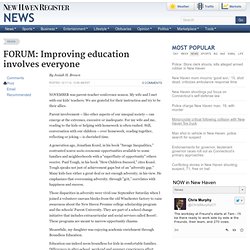
My wife and I met with our kids' teachers. We are grateful for their instruction and try to be their allies. Parent involvement -- like other aspects of our unequal society -- can emerge at the extremes, excessive or inadequate. For my wife and me, reading to the kids or helping with homework is often rushed. Still, conversation with our children -- over homework, reading together, reflecting or joking -- is cherished time. A generation ago, Jonathan Kozol, in his book "Savage Inequalities," contrasted scarce socio-economic opportunities available to some families and neighborhoods with a "superfluity of opportunity" others receive.
Those disparities in adversity were vivid one September Saturday when I joined a volunteer canvass blocks from the old Winchester factory to raise awareness about the New Haven Promise college scholarship program and the schools' Parent University. Parental engagement happens in different ways. Josiah H. In Search of Student-Generated Content in Online Education. Enabling students to create their own educational content increases engagement, improves learning, and can result in products of lasting value.
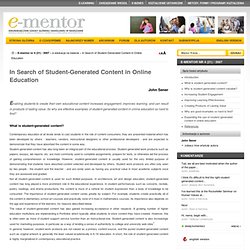
So why are effective examples of student-generated content in online education so hard to find? What is student-generated content? Contemporary education at all levels tends to cast students in the role of content consumers; they are presented material which has been developed by others - teachers, vendors, instructional designers or other professional developers - and are expected to demonstrate that they have absorbed the content in some way. Student-generated content has also long been an integral part of the educational process. Student-generated work products such as papers, essays, lab reports, etc. are most commonly used to complete assignments, prepare for tests, or otherwise aid the process of gaining comprehension or knowledge. Essay predicting radical change for higher education over next five years @insidehighered.
Rising tuition, declining government subsidies, stagnant endowments, and increased competition are challenging higher education like never before.
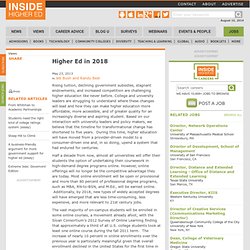
College and university leaders are struggling to understand where these changes will lead and how they can make higher education more affordable, more accessible, and of greater quality for an increasingly diverse and aspiring student. Based on our interaction with university leaders and policy makers, we believe that the timeline for transformational change has shortened to five years. During this time, higher education will have moved from a provider-driven model to a consumer-driven one and, in so doing, upend a system that had endured for centuries. Half a decade from now, almost all universities will offer their students the option of undertaking their coursework in high-demand degree programs online.
However, online offerings will no longer be the competitive advantage they are today. Cyber-Utopia vs. Cyber-Dystopia: Hanna Spegel at TEDxPannonia. Cyberdystopia: The Dark Side of Cyberized Education. In the Cyberdystopia scenario, the cyberization of education in an impending disaster -- nobody wins; humanity loses.
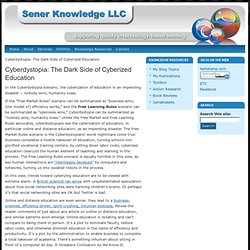
At Brooklyn Free School, A Movement Reborn With Liberty And No Testing For All. NEW YORK -- On a recent Wednesday morning at the Brooklyn Free School, a class was in session.
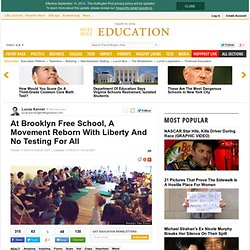
Ten students, ranging in age from about 12 to 16, sat around a table having a heated debate about chemistry. And superpowers. "Those elements don't really go together," said one boy in a hoodie and glasses. "Or I don't think they go together. " "But that would make it a good power," another boy piped in. "Maybe," The boy in the hoodie replied. This was Chemistry: The Gathering, a class where students were creating an "elemental" version of the popular card game, "Magic: The Gathering," involving different characters with specific chemical powers. As the animated back-and-forth went on, the young teacher, or "advisor," who could have been mistaken for a student, mostly sat quietly and listened. The Brooklyn Free School is looked to as a beacon for what independent, democratic schools can offer, especially to students who previously struggled in public schools.
"Yeah, I guess," she replied. National Education Standards: Both Sides of the Debate. Most adults remember standardized testing, used to assess how well students were learning and retaining the core material taught to them.
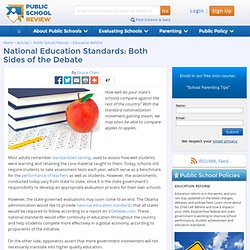
Today, schools still require students to take assessment tests each year, which serve as a benchmark for the performance of teachers as well as students. However, the assessments conducted today vary from state to state, since it is the state government’s responsibility to develop an appropriate evaluation process for their own schools. However, the state-governed evaluations may soon come to an end. The Obama administration would like to provide national education standards that all states would be required to follow, according to a report on VOANews.com. These national standards would offer continuity in education throughout the country and help students compete more effectively in a global economy, according to proponents of the initiative.
Introducing Common Core State Standards The Common Core State Standards include the following criteria: Has education become a business? May 7, 2010 at 1:09 am I was thinking (and it is always dangerous when I do that) about what teachers and schools and education were all like when I was much younger.
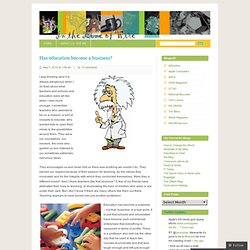
I remember teachers who seemed to be on a mission, a sort of crusade to educate, who wanted kids to open their minds to the possibilities around them. They were our counsellors, our mentors, the ones who guided us and listened to our sometimes extremely ridiculous ideas. They encouraged us and never told us there was anything we couldn’t do. They earned our respect because of their passion for teaching, for the values they inculcated and for the integrity with which they conducted themselves. Education has become a business – not that ‘business’ is a bad word. Now the same professor teaches 3 courses, has no time for research and the teaching assistants position no longer assists.
The De-Schooling Scenarios: (1) Free Market Rules. Two of the six scenarios -- Free Market Rules and Free Learning Rules envision the dissolution of formal education under the pressure of “free market” or “free learning” forces respectively.
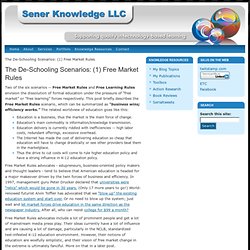
This post briefly describes the Free Market Rules scenario, which can be summarized as “business wins; efficiency works.” The related worldview of education goes like this: Education is a business, thus the market is the main force of change. Education’s main commodity is information/knowledge transmission. Education delivery is currently riddled with inefficiencies -- high labor costs, redundant offerings, excessive overhead.